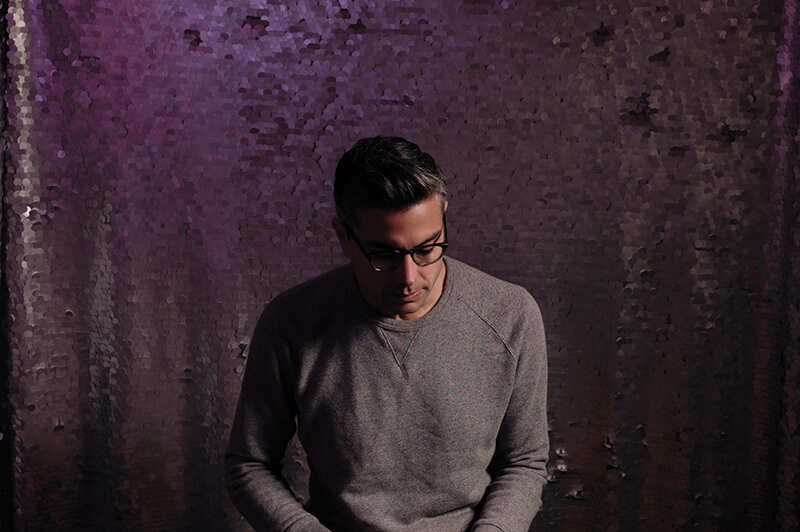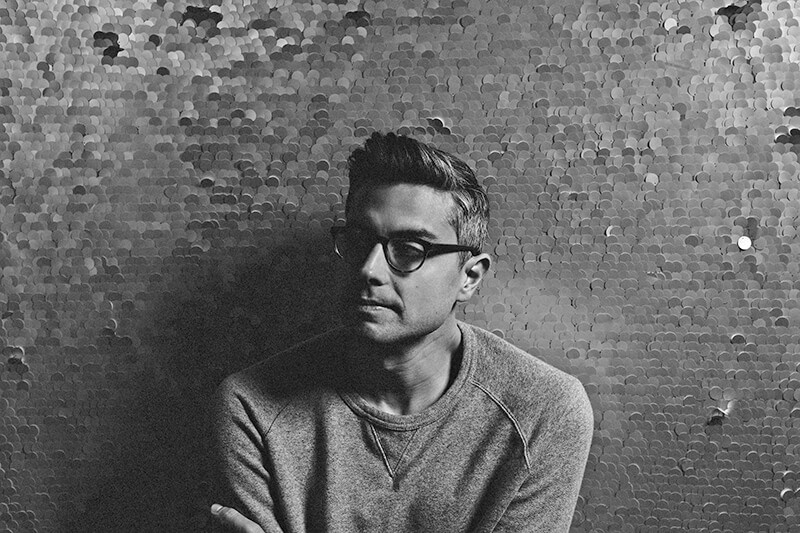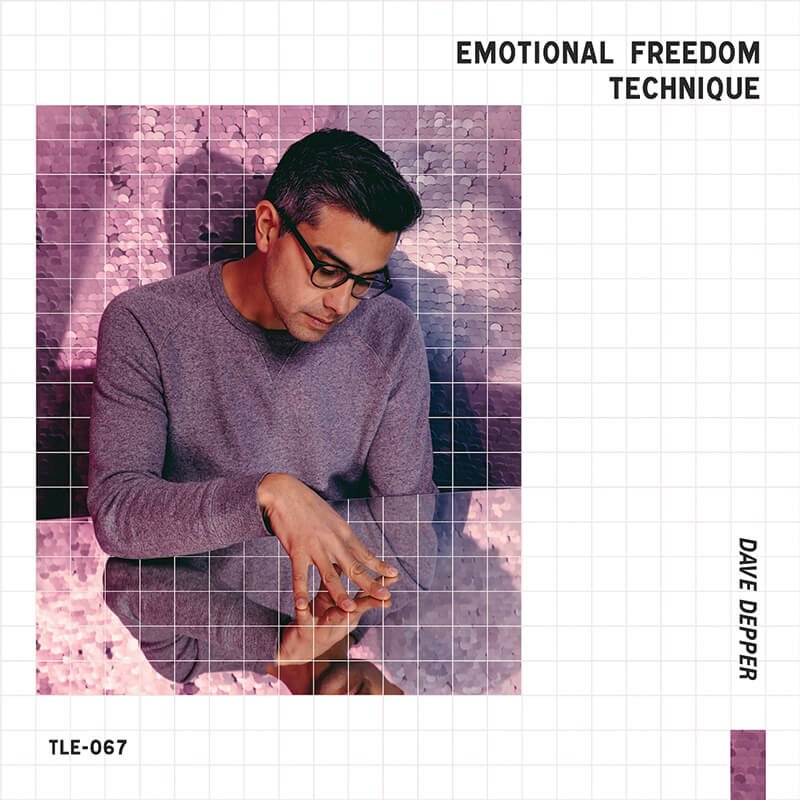While staving off a sore throat with some tea, Death Cab for Cutie’s Dave Depper talks about his journey as a musician in various bands to writing his own music, with the release of his new album, Emotional Freedom Technique on Portland’s Tender Loving Empire.
Why now, are you starting to write your own music?
I guess my origin story is that all of this happened kind of by accident. I never really intended to be a musician or touring musician, or anything like that, but one thing lead to another. Basically, I moved to Portland in 2003, and I always loved music, I’ve always played music, but I didn’t really do anything with it. And, just randomly I bought an organ off this guy and it turns out he ran a record label, that was Hush. He asked if I played bass and I said yes, even though I didn’t, and I joined his band. We recorded an album at a recording studio and the engineer liked my bass playing and asked if I would join his band and that band took me on my first tours and I kept meeting people…anyway, so you get the idea.
It kind of just snowballed into stuff and then, you know, like all freelance kind of things, it’s who you know and word of mouth and one thing led to another, which all accumulated to getting asked to join Death Cab for Cutie. That was the single most surprising thing to happen to me, and here I am.
The whole time I was touring, I was really interested in creating my own music, but it’s like, nothing felt authentically mine. Every time I would sit down to write a song I just felt like, why does this song need to exist, I have nothing to say. About five years ago, some friends and I decided to play the twenty-song game, where you and a few friends commit to writing twenty songs in twelve hours and you get together and you listen to each other’s songs and critique them. It’s this insane thing where you’re put into this totally frenetic head space of like, no ideas can be thrown out because you have so little time to work on any of these songs. You just have to go, “first thought, best thought.”
So, I did the game and I got to seventeen songs, and most of them were terrible. But a couple synth pop songs sort of appeared and when we were all listening, everyone’s heads kind of cocked and we’re all like, “Whoa, what’s that? I didn’t expect that from you, you’re a guitar player,” and all of a sudden, I realized this is the music I was meant to make. I love listening to synth pop, I love the Pet Shop Boys, I love Air, I love Caribou, and I decided to pick up that thread. And I’ve been on the road for most of the time over the past four or five years, but I kind of worked on it on and off, alternately abandoning and hating it, starting over and that kind of thing. But eventually about a year ago, I finally managed to finish it.

Let’s talk about what’s next, your new album. What you are trying to convey on Emotional Freedom Technique, as a solo artist?
Hmm, I guess, lyrically it’s a bit of a concept record about this period in my life that hopefully has come to a bit of a close. But it began with the demise of this very big relationship in my life and right around then, I started touring a bunch and instead of maybe properly recovering or healing from that, I went into this very strange world of being in a different city all the time and meeting different women in different cities, and dating long distance and all this stuff. Really losing sight of what I wanted out of love or relationships.
So, the album is sort of a self-indulgent meditation on some specific experiences I had with some people or kind of general feelings I have about the whole thing. I mean, the first song kind of lays it out. I had been dating someone and we were breaking up and she was just kind of exasperated and said, “Do you even want love?” and I just said, “I don’t even know what that means anymore.” And it was just a part of this long kind of break up discussion.
But thinking back on it, I was just like wow, that’s a really intense thing to think. It sort of just became the thesis statement of the whole record, I guess, which is why it’s the first song on it. So, lyrically that’s where it’s at. Musically, it’s kind of a weird hybrid of “dude learning how to make a record all by himself in his bedroom” and “the joy of discovering how to translate the songs in my head to actual sounds on a record” – combined with wanting to make my dream electronic dance pop record, and not quite getting there but getting to something else that I really like in the process.
It sounded like a lot of the songwriting happened on the road, is that right? What was your songwriting process for this record?
Well, I’d say the songs didn’t get written on the road, they got written in between being on the road. I can’t write at all on the road. My brain goes into this really primordial, primitive state where all I can think about is what meal is next, or when I’m going to the gym, or whatever. It’s weird, and a lot of touring musicians I talk to feel the same way. It sort of lobotomizes you while you’re out there.
I don’t know why, but I just can’t write on the road. So, I kind of wrote the music in the fleeting moments I was home. The process was interesting, it kind of evolved in stages. So, when I first played that twenty-song game, I was really excited by the sonic possibilities. I had never had free reign to translate what I was hearing in my head to something on a record, so I just carried away making all these songs without lyrics. And then when it came time to write lyrics, I found that I still didn’t know what I wanted to say. I would listen back on them and just kind of be unconvinced.
I played them for other people and get those polite responses, when you can tell you’re not quite getting there. Yeah, the album kind of existed like that for the first couple years and one day, I wrote… I just sat down and the last song on the record just kind of poured out of me. And the reaction that I got for that from friends that I respect was totally different. I realized right then, this is what I need to be doing. This is what’s going to make me feel better. I mean, because I immediately felt this almost therapeutic joy and relief in having made that song. And I thought the whole record should be that way. So, I made this rule that every song would be an honest snapshot of my feelings regarding this scenario that I told you about. And I wouldn’t say that the rest of the songs came easily, but once I came up with that as sort of the concept for the record, and using that song as a signpost, the rest filled itself in.

Sure, it became sort of a cathartic experience for you?
Totally, and that’s part of why the album is called Emotional Freedom Technique. I didn’t come up with that phrase, but when I heard it, and I was trying to come up with the name of the record, I was like, “that’s it” because making this record was my emotional freedom technique. As cheesy as that sounds, I’m in a different place in my life now, having made this record, than I was before. And I’m grateful for that part of the process.
So, when can we expect to see you play the album live?
What I have on the books right now are a Portland show and a Seattle show after the album releases. And I just got added to Bumbershoot in Seattle, which I’m stoked about. So, I’m just waiting to see how people are wanting to hear the album live and where they want to hear it… I’m excited to start playing these songs [on the road].
*Photos by Jaclyn Campanaro

Dave Depper – Emotional Freedom Technique
Standout Track: “Communication”
